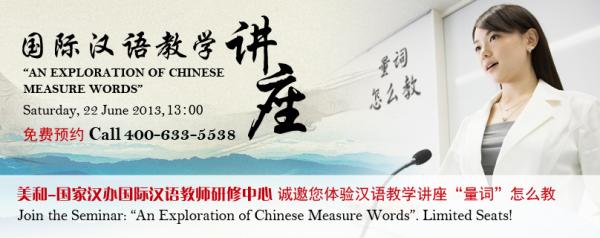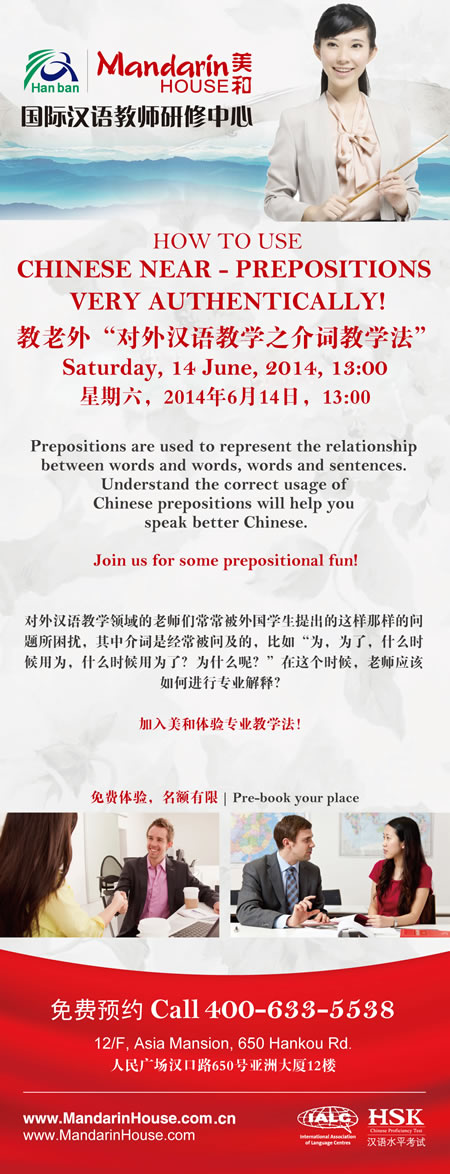Mandarin House Kicks Off Chinese Seminar Series

In an effort to go beyond the classroom with their educational services, on June 22 Mandarin House hosted their 1st in a series of professional seminars.
The free seminar series is held in both Chinese and English and is designed to bring together Chinese teachers and foreign students to examine topics and teaching methods outside of the typical classroom. Some areas of Chinese grammar and vocabulary are spread out over months or years in the standard curriculum. This series zeroes in on a topic and gives a full overview that wouldn’t fit well in the typical class format. The presenters are relative experts in Chinese and gave insights to both the Chinese and foreigners about these useful topics.
1st Seminar was titled An Exploration of Chinese Measure Words and it covered an explanation of the concept with detailed examples and interactive exercises.
2nd seminar was held on Saturday, July 20 at 13:00 in the Shanghai People’s Square school. The session focused on Modern Chinese Slang, the different types of slang and how to use it.
3rd seminar was held on Saturday, August 17. The session focused on Comparison Sentences. Comparative sentences are sentences whose predicates contain comparative words or comparative patterns. Mandarin comparisons are quite easy to construct.
4th seminar will be held on Saturday, September 14. The session will focus on Chinese Modal Verbs, There are about a dozen modal verbs in Chinese. Modal verbs such as 会huì can and 必须bìxū must are used to express feelings, intentions, capability, possibility and obligations. What creates the most confusion with these modal verbs is that some of them can all be translated into "can“ or "must" in English.
5th seminar will be held on Saturday, October 19. The session will focus on Chinese Near-Synonyms Words. Even for native Chinese speakers, near-synonyms (近义词 jìnyìcí) can be confusing and easily misused. The key is to combine knowledge and exposure. You have to actively look the words up in the dictionary, connect how they are used in different circumstances, understand the contexts, and remember their differences. It would be easier for Chinese language learners to start with easily misused words in normal conversations, which would not only increase exposure but also practice. For example, 成果, 后果, and 结果 all share the common meaning of “results” and “consequences”, but 成果 refers to achievements and good outcomes, 后果 is used to imply negative outcomes, whereas 结果 could mean both good and bad.
6th seminar will be held on Sunday, November 10. Prepositions are used to represent the relationship between words and words, words and sentences. Understand the correct usage of Chinese prepositions will help you speak better Chinese.
7th seminar will be held on Saturday, December 14. The session will focus on Mandarin particles. Foreign students who have achieved a good mastery of Mandarin often still struggle to convey their meaning correctly and without ambiguity.Even after years of learning and studying Mandarin some students continue to make spoken mistakes. Often the reason for these mistakes is a misuse of Mandarin particles.
8th seminar will be held on Sunday, January 12. The session will focus on Chinese measure words. The modern Chinese languages make frequent use of what are called classifiers or measure words. welcome to join us to be proficient.
9th seminar will be held on Saturday, February 22, 2014. The session will focus on Chinese Near-Synonyms Words. Foreigners in Chinese learning process, often encounter synonyms Discrimination doubt. Come join the United States teaching methods and school lectures synonyms study it!
10th seminar will be held on Saturday, March 15, 2014. The session will focus on Mandarin Particles. Foreign students who have achieved a good mastery of Mandarin often still struggle to convey their meaning correctly and without ambiguity. Do you want to learn more about teaching Mandarin, Mandarin particles and how to help your foreign friends and colleagues learn Mandarin more effectively? Come along to our lecture about “how to use particles fluently”.
11th seminar will be held on Saturday, April 19, 2014. The session will also focus on Mandarin Particles.
12th seminar will be held on Saturday, May 17, 2014. The session will also focus on Mandarin syntactic teaching.
13th seminar will be held on saturday, June 14, 2014. The session will focus on how to use Chiense near prepositions very authentically.
Join us and learn to speak like a native!
See the flyer below for more information or contact us directly to reserve your seat.
400-633-5538



